The BMW i5 Is The Impossible Burger Of Electric Sedans

There’s a common trope in automotive writing – it’s common to bemoan the death of the ICE, and complain that EVs will never match the soul and spirit of gas-powered cars. Chuck in tacky, if not straight-up hackneyed metaphors comparing electric vehicles to vegan meals; a piece of fruit dressed to look like meat will never be as satisfying as a big juicy steak from some New York steakhouse most readers will ever go to. I mean, I guess, sure. It’s not wrong – gas-powered cars don’t act like EVs. A slice of watermelon grilled and doused in A1 steak sauce and Liquid Smoke is a terribly unsatisfactory approximation of a T-bone steak.
EV Racing In Italy | Jalopnik Visits
Photo: Kevin Williams
It’s silly to assume that a piece of hot watermelon is representative of the entire universe of vegan and vegetarian cuisine. Personally, I think vegan and vegetarian meals are best when they embrace the essence of the ingredients they’re comprised of. Dishes like Palak Paneer and Falafel are god-tier meatless dishes that people seek out because they taste good. They stand on their own merits, they don’t need meat at all, nor does it seem like they’re emulating meat dish.
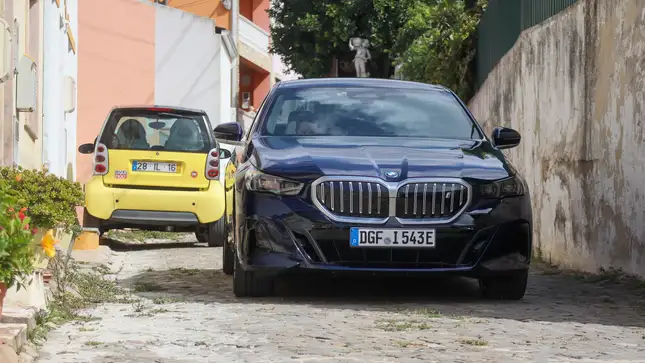
Photo: Kevin Williams
But science has brought meat replacements a long way. There’s no need to play pretend with an acrid piece of slimy watermelon when you can easily get a pack of Impossible Burgers or Beyond Meat patties that taste 95% like ground beef.
After driving two different variants of the new BMW i5 around southern Portugal, I’ve realized that the BMW i5 is less falafel and more Impossible Burger. It’s a 5-series that feels mostly normal, but under the skin, it’s metaphorically meatless and therefore better for you. I think that’s a good thing?
(NOTE: BMW flew me from my house in Ohio, all the way to Lisbon, Portugal, to test out the i5 which included me confronting my fear of heights by crossing the 486-foot-high Vasco Da Gama bridge.)
The BMW i5 is a really important car for the German brand, especially in the US. To my surprise, the 5-series isn’t actually as popular in Europe as one would think – the brand says that its most important markets are the US, South Korea, and China, in that order. It’s also going for volume, which may explain the i5’s lack of boundary-pushing in terms of styling.
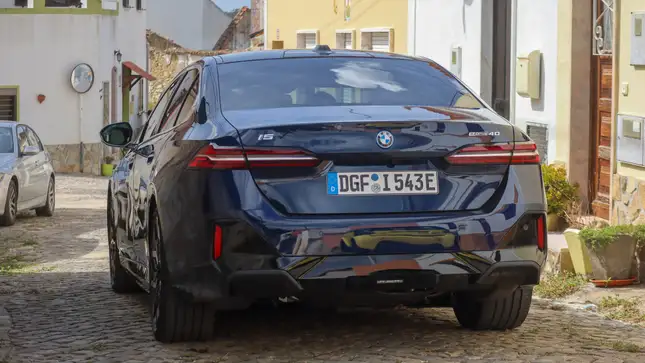
Photo: Kevin Williams
As the world’s car market becomes increasingly electrified, some automakers seem to have cold feet. Yes, they all talk a big game, but when it comes to producing, electrifying and selling models that sell in big volumes, and not just weird niches of expensive/ugly cars, many are behind. The cough-drop-shaped Mercedes EQE and EQS are offered in parallel to the standard E and S class. If you’re unsure of EV power or don’t like the styling of those two cars, Mercedes-Benz will happily sell you a traditionally styled E or S class sedan. Has it paid off? Eh, it’s not clear, EQ sales are up, but I’d imagine the unconventional styling is a hindrance. Mercedes-Benz has admitted it will soon discontinue these models for more traditionally styled, electrified versions of the C, E, and S class.
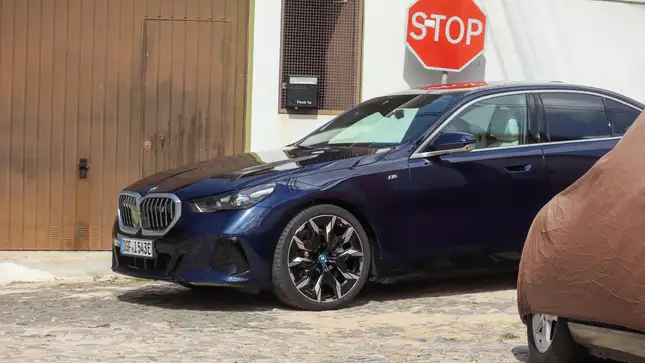
Photo: Kevin Williams
BMW has beaten Mercedes to this conclusion. Like the i7 and 7-series, the i5 and ICE-powered 5-series look identical. In theory, the normal styling should get more butts into seats, as now they’ll just have to figure out if they can work with an electric vehicle, rather than trying to stomach a car that is very different from its gas-powered equivalent. BMW is aiming for 30% of all 5-series sold worldwide to be the electric i5. If we focus solely on the European market, that number increases to 50%.
As far as styling, the i5 is the nicest recent BMW by a landslide. The iX is ugly, and I’ve been vocal about how little I like the i7 and 7-series – that car has a busy front fascia that distracts from the fact its profile and proportions are boring. However, the i5 is genuinely pleasurable to look upon. The side surfacing is refreshingly clean, nothing on the side of the i5 looks overly fussy or overwrought. The car’s proportions are strong, it’s a hair more cab-rearward than the 5-series of yore, but it’s not done so in a way that makes the i5 look like a practically-compromised cartoon drawing. It’s a nice-looking car, it looks either sporty or expensive depending on whether it’s in M guise or luxury trim.
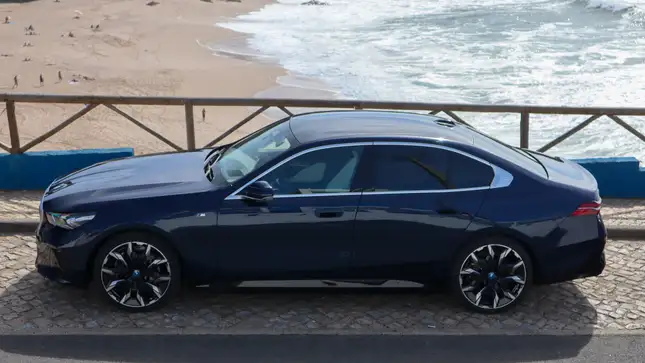
Photo: Kevin Williams
The interior is cool, too. It’s not quite as grandiose as the ultra-luxury aspiring i7, but it takes a lot of the good points and applies them in a smaller package. Like the i7, and recently released X1, the i5’s interior feels almost architectural in essence. The interior is filled with lines, angles, and rectilinear forms that are subtly more complicated than they appear at first glance. For example, the main 12.3-inch and 14.9-inch tandem-mounted gauge cluster and infotainment screen may just look like any ol’ screen setup common to nearly every other modern car, but it’s actually a curved display with one of the smallest bezels in the business. A color-changing, geometric crystalline trim that separates the top of the dash from the bottom adds a bit of ambiance to a well-made (if a little pretentious) interior design.
BMW is choosing to lead with the i5 instead of the ICE variants of the 5-series, which may fool you into thinking it is a ground-up EV platform. It’s not. Like the i7, the i5 also uses a new variant of the CLAR (Cluster Architecture) platform it used on the outgoing model, re-engineered to accommodate battery electric powertrains seamlessly. It works – like the i7, the i5 makes few ergonomic compromises to accommodate the EV powertrain. Legroom and trunk size are generally identical between the cars. The i5 doesn’t have a weirdly high floor like many cars that are available in both gas and EV form, say, the Genesis G80. Unfortunately, the i5 doesn’t have a frunk, despite having such a long hood.
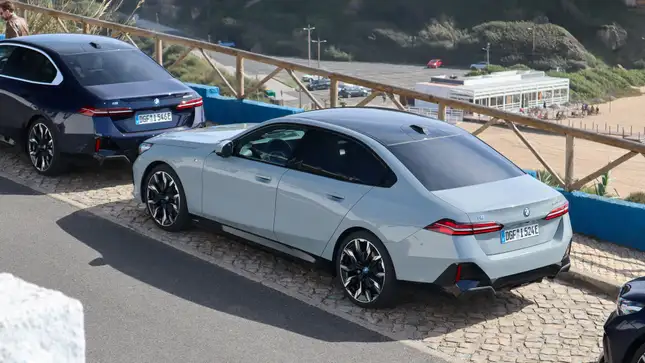
Photo: Kevin Williams
BMW’s penchant for using the same engines and transmissions mostly interchangeably between way different applications in its lineup is alive and well in the electric era. BMW allowed us to drive the single-motor i5 eDrive40, and the dual-motor, M-Performance i5 xDrive M60. The eDrive40 has a similar rear-mounted, 335 horsepower motor, albeit with 295 Ft-Lbs of torque compared to the i4 eDrive40’s 317 ft-lbs. The top-level i5 M60 xDrive uses the same 335 horsepower rear motor but adds a 257 horsepower front motor for a total output of 593 horsepower, and 605 ft-lbs of torque when the boost paddle is pulled.
It can be hard to make sense of horsepower numbers these days. When some EV competitors are advertising four-digit horsepower numbers, and motors on each wheel, a measly 335 horsepower from one single motor can seem uncompetitive. But, it isn’t. 335 horsepower is a lot of power, actually.
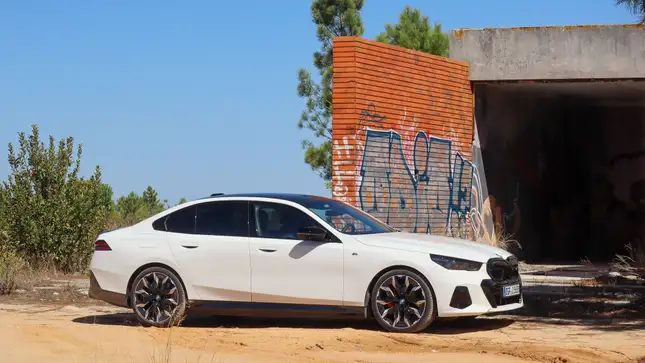
Photo: Kevin Williams
Both the eDrive40 and M60 xDrive are sufficiently swift cars; the eDrive 40 in particular is the most impressive. If you aren’t looking for all-wheel-drive traction (or dual motor power), its single motor and respectable 0-60 time of 5.7 seconds is likely more than any BMW driver would ever need. Impressive, but performance numbers are only part of the picture here.
BMW also hired composer Hans Zimmer to create a set of sounds that engender emotion while driving BMW’s EVs. BMW calls it “IconicSounds,” but in layman’s terms, it’s just simulated engine noise. Now, in sport mode, the sounds are a little over-the-top, but the real story is how it behaves in the BMW’s normal modes. Under constant cruising, or light to moderate acceleration, the i5 has a mild throaty buzz that stays proportional to both pedal position and road speed. It’s pleasant, but also very ignorable – the sound feels comfortably like a background element, and not like it’ll overtake a conversation or drown out the stereo. It feels familiar, but not gimmicky or annoying. Importantly, with the sounds enabled, the i5 feels like any other gas car on the market. I’d wager that most drivers wouldn’t even notice that the i5 is electric. Is that a good thing? I don’t know – I personally enjoy EVs that embrace their ultra quiet EV nature and eschew fake engine sounds altogether. But if you’re gonna do it, then do it right. The i5 does it right.
Like the i7, the i5 isn’t the lightest vehicle on the road. The low-mounted, heavy battery does wonders for ride comfort, but that excess weight isn’t ideal for driver engagement. However, the i5’s shorter wheelbase, overall smaller dimensions, and suspension and chassis tuning make the i5 feel remarkably engaging. Unlike the i7 M70, where I assert that its additional M-credentials don’t add much aside from power, the M50’s sharper suspension and steering do credibly feel more engaging than the standard model.

Photo: Kevin Williams
But, that doesn’t mean the i5 is perfect, though.
The i5’s brakes are inconsistent, sometimes they feel great, but other times (especially during hard driving), the changeover from regenerative to friction braking can be abrupt and and feel unrefined. There’s no true one-pedal driving, either.

Photo: Kevin Williams
Although I am generally indifferent to frunks, it is disappointing that the i5 does not have one. BMW i5 program lead admitted that there’s nothing but an empty cavity underneath the hood, particularly in single-motor form, and yet there’s no way to access or use that space.
Finally, the EV range is merely okay. It’ll do about 295 miles in eDrive40 form, and 256 in the M60 xDrive – both from an 81.2 kWh (usable) battery.
The base i5 eDrive40 starts at $67,795, a steal compared to its closest competitors, the Genesis G80 Electrified, and Mercedes Benz EQE 350+. The i5 has more power than the base EQE, and its low price tag embarrasses the Mercedes Benz and Genesis’s respective roughly $75,000 and $80,000 pricetags. Yet, whereas the G80 comes standard with AWD, or the EQE can be optioned with AWD, buyers are forced to step up to the i5 M60 to get all-weather traction. At $85,095, the i5 M60’s level of luxury and performance is still a bargain compared to AMG versions of the EQE which reach into the six-figure range. Most importantly, a base i5 is about $9,000 more expensive than a base gas-powered 530i. Expensive, but priced close enough that a traditional gas car buyer could be swayed to make the jump to electric.
In short, the i5 feels a lot like the 5-series we’ve always known, it just so happens to be electric. It’s a lot like the first time I took a bite of an impossible burger – I came in expecting to hate the thing, thinking it’d be a poor emulation of a well-loved favorite. Instead, I found a shockingly convincing meat replacement that was generally pretty yummy. It wasn’t perfect, but I’d definitely eat it again.
The BMW i5 might be the vehicle to turn the brand’s EVs from niche player to volume seller.

Photo: Kevin Williams



